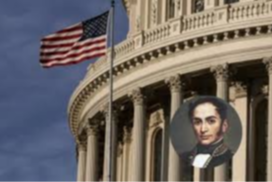
Photo: Mercosur Press
By Roberto Morejón
As on other occasions, an official body of the United States has manipulated the name of a hero of the Americas to introduce a hostile law against a country of the continent.
In a disrespectful and harmful act, the House of Representatives approved the so-called "Act Prohibiting Transactions and Leases with the Illegitimate Authoritarian Regime of Venezuela", an extemporaneous, pompous and aggressive title with the abbreviated name of "Bolivar Act".
The deeply punitive content and the abbreviated name have provoked a just rejection by the Venezuelan government and people, for the offence of using the name of the liberator.
The decree prohibits the government of the northern power from signing contracts with people who have commercial links with the government of President Nicolás Maduro or any successor not recognized by the United States.
As is well known, the administration of outgoing Prime Minister Joseph Biden said it would accept as Venezuela's statesman the far-right oppositionist Edmundo Gonzalez.
The latter, a puppet of coup leader María Corina Machado and a favorite of Washington, claims to be the winner of the 28 July elections, but the only body authorized to make such a judgement is the Electoral Council, which attributed the victory to Maduro.
As expected, Venezuelans have reacted angrily to the so-called Bolivarian Law, which is seen in Caracas as a new sanction to add to the arsenal of more than 900.
The National Assembly debated and drafted the Simón Bolívar Liberator Organic Law against Washington's blockade and in defense of the Bolivarian Republic.
In an in-depth debate, the Venezuelan lawmakers stressed that the law under preparation is a legal instrument to confront external punishments aimed at breaking the country, contrary to international law and the UN Charter.
Venezuelans consider the bill necessary and timely to prevent impunity for fanatical opponents who urge Washington to such nonsense and then try to run for elected office.
The sponsors defend the patriotic and anti-imperialist dignity of Simón Bolívar, which has been misrepresented by members of the US House of Representatives.
The debate on the law is taking place at a time of political and social upheaval in Venezuela, when the government is relying on institutionalization, gathering forces and laying conceptual foundations.
As reaffirmed in these meetings, El Libertador is a symbol of freedom and not of punishment, of self-determination and not of subjugation.

